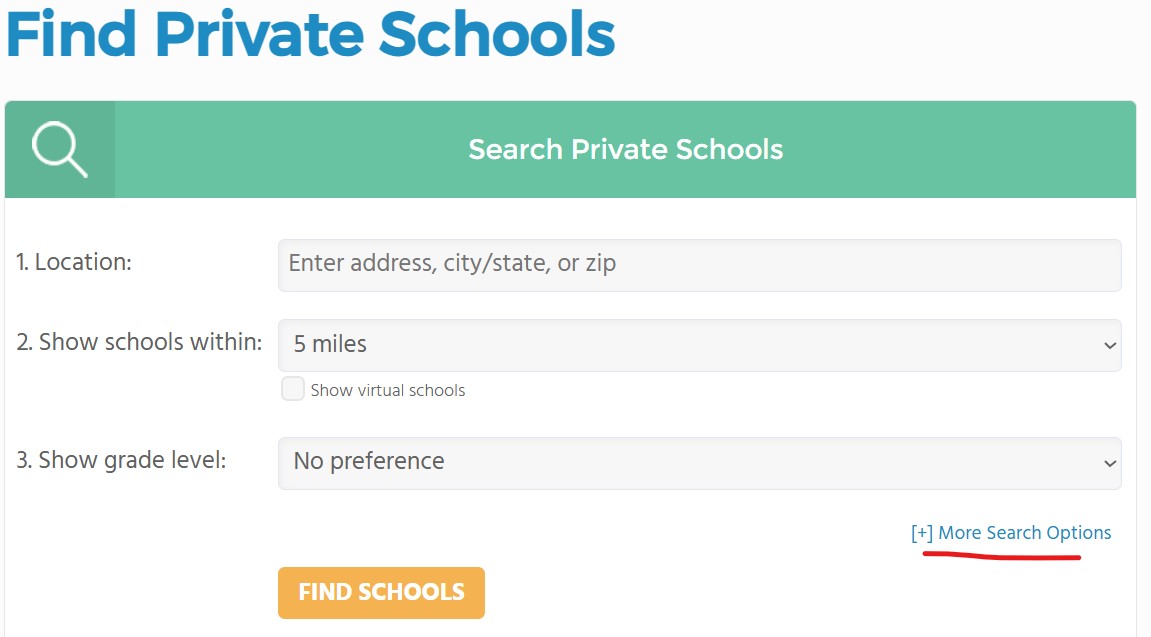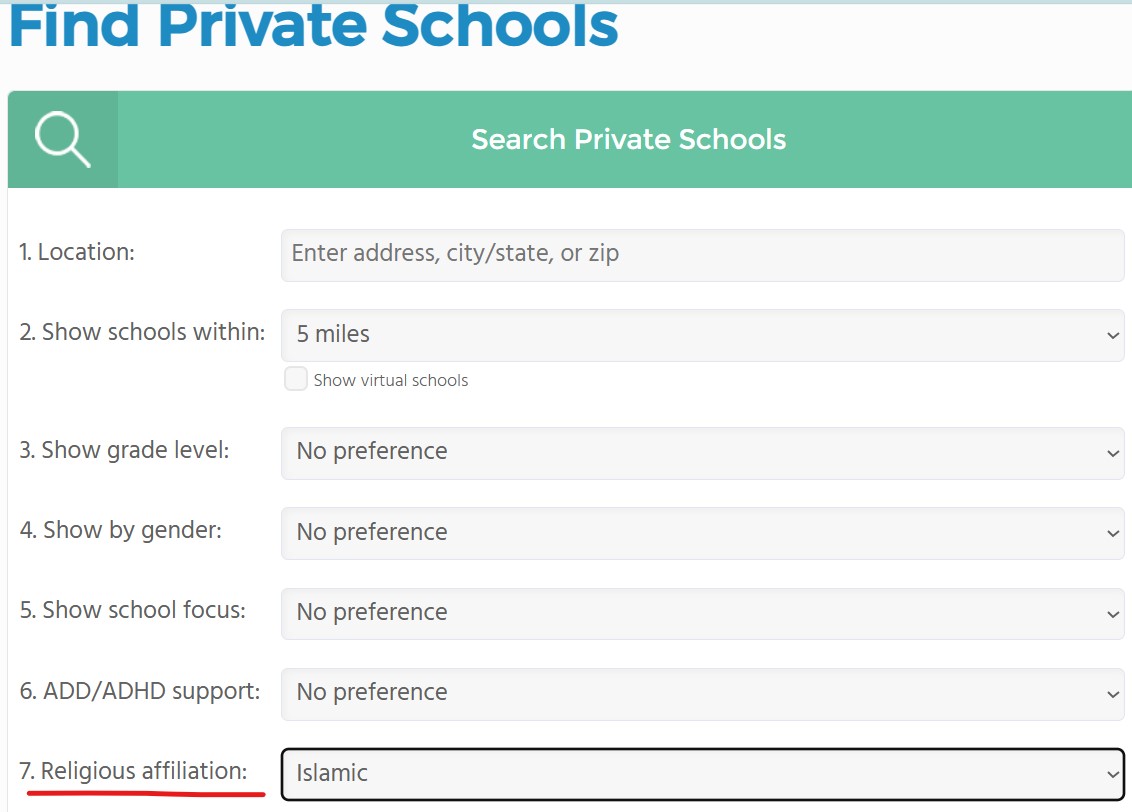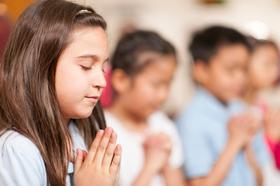The Spectrum of Islamic Education: From Secular to Orthodox
One of the reasons many parents send their children to private schools is to receive a comprehensive approach to their religion in the school's curriculum and activities. In this article, we'll offer some answers to questions about an Islamic education.
Looking for Islamic schools?? Use the powerful search engine on PrivateSchoolReview.com to see what schools are near you. Your Imam will also be able to help you select schools.

After you click on "Find Schools", click on Advanced Seach in the lower right-hand corner of the next screen.

Then select line 7.

Now, here are some common questions parents have about sending their children to an Islamic school.
Parent: Who should consider an Islamic education for their child?
Imam: Any parent who wishes to instill Islamic values, ethics, and knowledge in their children should consider an Islamic education. In today’s secular society, where competing ideologies and distractions often challenge our faith, it is essential to provide young people with a strong foundation in Islam. As the Prophet Muhammad (peace be upon him) said, "طلب العلم فريضة على كل مسلم" (Talab al-'ilm fareedah 'ala kulli muslim) — "Seeking knowledge is an obligation upon every Muslim." An Islamic education ensures that children grow up understanding their identity as Muslims while learning how to navigate the world with confidence and faith.
Our mission at MAYA is to provide students with a quality education within the boundaries of a sound and wholesome Islamic environment. We are committed to providing an atmosphere conducive to learning and growth to the student`s fullest potential through the integration of various aspects of the child`s academic, physical, social, emotional, and spiritual development. Source: MAYA School
Parent: What does an Islamic education entail?
Imam: An Islamic education can take many forms, depending on the level of religious immersion you wish for your child. It ranges from secular schools that offer Islamic studies as part of the curriculum to full-time Islamic schools or traditional madrasas.
- Secular Schools with Islamic Studies: These schools integrate Islamic ethics and values into a broader academic curriculum. For example, Al-Manarat Heights Islamic School in Mississauga, Ontario, offers a balance of the Province of Ontario’s academic standards alongside Islamic studies.
- Islamic Day Schools: These schools, such as the ISNA Schools, balance strong academics with daily prayers, Quranic memorization, and Islamic character-building.
- Madrasas: Traditional learning centers like the Miftaah Institute in Warren, Michigan, specialize in intensive Quranic studies, Hadith sciences, and preserving classical Islamic teachings.
Each of these options caters to different needs, but all aim to nurture children spiritually and academically.
Yjis video offers a look ay Islamic education in the United States.
Parent: Where can I find these types of schools?
Imam: Alhamdulillah (Praise be to Allah), many options exist worldwide. In North America, institutions like ISNA Schools or Al-Huda School provide excellent examples of full-time Islamic education. Many communities also have local Islamic day schools or weekend programs for supplementary education. Researching your local area or consulting your mosque is often the best way to start.
Parent: When should I start my child’s religious education?
Imam: The earlier, the better. The Prophet Muhammad (peace be upon him) emphasized the importance of early education when he said, "The best gift a father can give to his child is education and upbringing." Starting young allows children to absorb Islamic teachings naturally as part of their daily lives. Many parents begin by teaching their children to memorize verses from the Quran coupled with basic Arabic lessons at home or through weekend programs. They do this before transitioning to more structured schooling.
Parent: Why is an Islamic education important in today’s secular society?
Imam: We live in a time where secularism dominates so much of our public life. While a secular education does provide essential skills and knowledge, it often overlooks spiritual development and moral guidance. It also lacks the training and immersion that a religious-centered education provides. An Islamic education ensures that our children understand their purpose as servants of Allah (SWT) and become contributors to society. It fosters a sense of identity and belonging that helps them resist harmful influences.As Imam Ali ibn Abi Talib (may Allah be pleased with him) wisely said, "He who has no one to guide him will follow the path of misguidance." A strong religious foundation equips young people with the tools they need to make ethical decisions and remain steadfast in their faith.
Parent: How can I ensure my child receives a balanced education?
Imam: Balance is key. Look for schools that combine academic excellence with sound Islamic teachings. Institutions like Great Revelations Academy in Detroit, Michigan, integrate STEM subjects with Quranic lessons and moral education. Additionally, parents play a crucial role by reinforcing Islamic values at home through family prayers (salah), storytelling from the Seerah (life of the Prophet), and discussions about contemporary issues from an Islamic perspective. It’s also vital to encourage critical thinking within an Islamic framework so your children learn how to apply their faith in real-world situations. As the saying goes, "العلم نور" (Al-'ilmu noor) — "Knowledge is light." A well-rounded education illuminates both the mind and soul.
This video offers a look at a day in the life of an Islamic school.
Parent: What if I can’t afford full-time Islamic schooling?
Imam: Not every family has access to full-time Islamic schools or madrasas due to financial or geographical constraints. However, there are still many ways to provide your child with a strong Islamic education:
- Enroll them in weekend madrasa programs at your local mosque.
- Use online resources for Quranic studies or Arabic language learning.
- Create an Islamic environment at home by practicing daily dhikr (remembrance of Allah), reading books about Islam together, and encouraging good character.
Remember that even small efforts are valuable in shaping your child’s faith. As Allah (SWT) says in the Quran: "فَاتَّقُوا اللَّهَ مَا اسْتَطَعْتُمْ" (Fattaqoo Allaha ma istata'tum) — "So fear Allah as much as you are able" [Quran 64:16]. By providing children with an education rooted in Islam, we prepare them not only for success in this world but also for eternal success in the Hereafter. May Allah guide us all in raising righteous generations who embody the teachings of Islam. Ameen!
Conclusion
Some key points stand out about Islamic education. It emphasizes the integration of faith and academics, aiming to produce well-rounded individuals who excel in worldly and spiritual matters. Character development is a central focus, with teachings from the Quran and Sunnah used to instill values like honesty, humility, and respect. Most Islamic schools offer curricula that often include various subjects beyond religious studies, including sciences, mathematics, and literature, viewed through an Islamic lens. There's a strong emphasis on moral and ethical education, preparing students to navigate complex real-world situations with Islamic principles as their guide. The ultimate goal extends beyond personal success to contributing positively to the broader community and society.
Questions? Contact us on Facebook or Instagram. @privateschoolreview
#MuslimEducation #IslamicSchools #FaithBasedLearning























